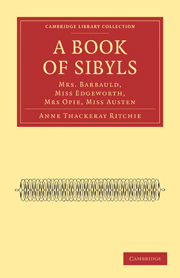JANE AUSTEN [1775–1817]
Published online by Cambridge University Press: 01 March 2011
Summary
‘A mesure qu'on a plus d'esprit on trouve qu'il y a plus d'hommes originaux. Les gens du commun ne trouvent pas de difference entre les hommes.
–Pascal.‘I Did not know that you were a studier of character,’ says Bingley to Elizabeth. ‘It must be an amusing study.’
‘Yes, but intricate characters are the most amusing. They have at least that advantage.’
‘The country,’ said Darcy, ‘can in general supply but few subjects for such a study. In a country neighbourhood you move in a very confined and unvarying society.’
‘But people themselves alter so much,’ Elizabeth answers, ‘that there is something new to be observed in them for ever.’
‘Yes, indeed,’ cried Mrs. Bennet, offended by Darcy's manner of mentioning a country neighbourhood; ‘I assure you that we have quite as much of that going on in the country as in town.’
‘Everybody was surprised, and Darcy, after looking at her for a moment, turned silently away. Mrs. Bennet, who fancied she had gained a complete victory over him, continued her triumph.’
These people belong to a whole world of familiar acquaintances, who are, notwithstanding their old-fashioned dresses and quaint expressions, more alive to us than a great many of the people among whom we live. We know so much more about them to begin with. Notwithstanding a certain reticence and self-control which seems to belong to their age, and with all their quaint dresses, and ceremonies, and manners, the ladies and gentlemen in ‘Pride and Prejudice’ and its companion novels seem like living people out of our own acquaintance transported bodily into a bygone age, represented in the half-dozen books that contain Jane Austen's works.
- Type
- Chapter
- Information
- A Book of SibylsMrs. Barbauld, Miss Edgeworth, Mrs Opie, Miss Austen, pp. 197 - 229Publisher: Cambridge University PressPrint publication year: 2010First published in: 1883

